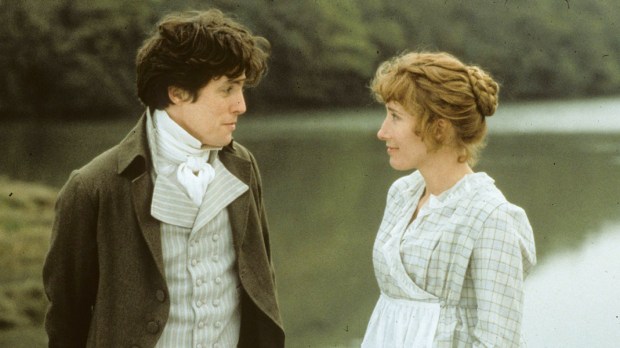Jane Austen helps us understand the two types of love, spelled out in the title of her famous book: Sense and Sensibility.
What causes two people to fall in love? The typical answer might be that it begins with physical attraction, deep conversation, or sharing in laughter – all good responses. Love is like a fire that is first lit by a single spark. For instance, on my first date with Amber, the woman who would become my wife, we sat by a garden stream where I marveled at her pale blue eyes and wind-chime laugh. Simply being near her caused a sea-change in my heart, and my senses felt as though a tidal moon had risen over the horizon and washed me away. I was, as they say, swept off my feet.
Read more:
Why Men Like Jane Austen
The initial bracing feeling of nervous love is the stuff of Shakespearean sonnets. But after the electricity has subsided, what is left of love?
, and one young girl answered that it is to “kiss and they be gross.” Another young man declared his undying love for a girl at school because she “has beautiful toys.”I’m not convinced adults would get better marks on a similar pop-quiz. My cynicism is based on experience, because in my work at church people often ask for help through the annulment process after a divorce. Many of these people had been married for years without really knowing what love and marriage really are, and because they hadn’t formed a true bond their relationships had come apart.
Some of us may labor under a misunderstanding about love, and because of this many relationships cannot survive beyond the initial, romantic spark.
This isn’t a new problem. Jane Austen wrote about the same conundrum a little over 200 years ago when she published the novel Sense and Sensibility. In it, she proposes two possible ways to define love. Her insights are instructive to us today as we continue to seek, struggle with, and deepen the love that is the only solid basis for a happy, committed marriage.
Jane Austen is never coy, so the two types of love are spelled out right in the title – Sense and Sensibility.
Sensibility
Sensibility is the whisper in your ear to follow your heart, find joy in the physical senses, and feel deeply.
It’s the love you feel when you first hold hands as a teenager, or cry at your wedding, or can’t wait to be in the room with your secret crush to simply be nearby.
Sensibility is swayed by what it sees and, although it comes naturally and can be a good trait, it also carries danger because emotions are unreliable. The eye can deceive and emotions wax and wane.

Read more:
6 Ways to find your purpose in life according to St. Ignatius of Loyola
Austen’s character Marianne Dashwood, the 16-year-old second daughter of Mr. and Mrs. Dashwood, is the embodiment of sensibility. She desperately loves a man named Willoughby and “When he was present she had no eyes for anyone else. Everything he did was right. Everything he said was clever.” Later, Austen writes, “Marianne, with excellent abilities and an excellent disposition, was neither reasonable nor candid.” In other words, she’s a nice person, but her sensibility leads her astray. She’s enchanted by the surface qualities of a man and fails to look deeper.
Sensible love cannot survive alone and soon Marianne’s crush devastates her. Because her emotions are her primary way of experiencing love, she is left miserable and unable to rise above them. She spends entire evenings moping in what Austen calls an “indulgence of feeling.” Romantic sensibility makes the world go round, but even a kiss can be a sign of betrayal.
Sense
In a play on words, Austen describes a similar-sounding but entirely different approach to love — using good sense. When it comes to a life-long love, good sense chooses the steady partner over the handsome flirt, the person who is faithful over the one who makes your heart tingle. Sense, typified in the character of Elinor Dashwood, Marianne’s older sister, chooses what the mind says is reasonable in spite of feelings. Austen writes of Elinor: “She was stronger alone; and her own good sense so well supported her, that her firmness was as unshaken, her appearance of cheerfulness as invariable, as, with regrets so poignant and so fresh, it was possible for them to be.” In other words, even if she had reason to feel bad, she worked hard to talk herself into a better state of mind.

Read more:
The things that we love tell us what we are.
Elinor, like Marianne, falls in love with a man. Her eminently sensible reasons why, though, are quite different. Although Edward is not physically attractive, she loves him because, “his mind is well-informed, his enjoyment of books exceedingly great, his imagination lively, his observation just and correct, and his taste delicate and pure.”
Be still, my beating heart! Perhaps we might, like Elinor, be able to reason our way into dating or even marrying a person, but shouldn’t there be more to love than this?
The third way
In the end, neither sense nor sensibility is enough. We can’t simply reason our way into loving someone, and neither is it healthy to chase every emotional attraction with no further thought. By the end of Sense and Sensibility, both Elinor and Marianne learn the lesson that either extreme will limit love and eventually kill it. There is no method – love contains both sense and sensibility, both the spark of romance and the reasonable, faithful commitment that carries a couple through hard times.

Read more:
4 Keys to achieving married love for life
To this day we struggle to understand love, which is why Jane Austen’s classic remains relevant. If Austen, who was admittedly prone to sensibility (she did, after all, spend her time writing romance novels), were here today, I suspect she would have some practical advice along the following lines:
When emotions overwhelm you, take time to work through them with a little good sense.
Over time, emotions can and will change. On the other hand, don’t settle for the wrong person simply because all the facts “seem” right.
If the heart isn’t in it, that could be a sign that the spark that leads to mature love isn’t there.
Love takes everything that we are. It’s a reasonable commitment of the heart, and an act of the will that vows eternal faithfulness and unity. One of the most valuable lessons Sense and Sensibility teaches is that, even if we can say what love is not, it’s such a soul-encompassing reality that it ultimately defies our attempts to define what it is. In the end, love is a gift of the whole self, body and soul — sense and sensibility.

